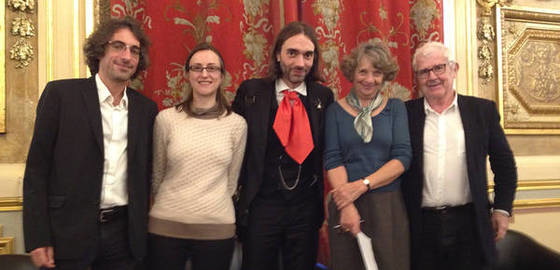Professor Itzhak Gilboa discusses the relationship between Decision Analysis and Being Human
This year’s annual 'Les Entretiens de la Cité' conference in Lyon hosted by Fields Medal and HEC Paris Honoris Causa Cédric Villani, saw Itzhak Gilboa, Professor of Economics and Decision Sciences at HEC Paris, deliver a speech on what it means to Be Human. He gleaned over the history of decision sciences, discussed the evolution of decision theory, and concluded his talk by examining the ways in which the two overlapped with our understanding of humanity, and thus what it means to Be Human. Joined alongside him was an eclectic panel of esteemed researchers including Véronique Izard, CNRS Researcher in Cognitive Sciences; Anne-Christine Taylor, CNSR Director & Ethnologist, and Hervé Le Bras, Demographer and Emeritus Researcher at the Institut National d'Etudes Démographiques (INED).

Professor Gilboa began his talk by elucidating that the very act of decision-making was not in fact unique to humans, and drew on examples from all corners of the globe: “a plant that turns its branches to face the sun, […] a tiger who decides if and when to start chasing its prey, […] an alpha-male ape who decides whom to grant privileges to in its clan”. With the act of decision-making being ever-present not only across species, but even going as far as extending to other orders of life such as plants, the audience naturally came to question the viability of decision-making being called upon as a defining characteristic of humanity. Professor Gilboa explained that whilst it is clear that the very act of decision-making is widely practiced across different domains, it is actually the ability to analyze one’s decisions that sets humans apart from their decision-making counterparts. But what do we mean by decision analysis?
According to Professor Gilboa, “decision analysis has many manifestations, occurring prior to, during, and following a decision”. He expounded on this point by recounting a human’s ability to recall past decisions, the effects from said decisions, and ability to use this information – be it consciously or otherwise - to influence present decisions. He went on further to describe a human’s ability to concurrently entertain a plethora of hypothetical outcomes along with their knock-on effects – once more, using this information to influence present decisions. And it is exactly the mental process involved “prior to, during, and following a decision” – decision analysis – that is the far more advanced skill unique to humans, and it is due to its exclusivity to humans that it can be said that decision analysis is an attributing factor to what is to Be Human.
It may thus come as no surprise that decision theory itself developed as a field more or less as soon as humans became the object of academic study. In Europe, somewhere between the Renaissance and the Enlightenment the social sciences were born, and intellectual activity was not directed only to external forces – God, or even Nature – but also internally, to humans and the societies they form. And, indeed, in the mid-17th century, Gilboa argues, decision theory was born with Blaise Pascal’s wager. While other great minds were still interested in proofs of the existence of a superior being, Blaise Pascal’s wager placed the emphasis on the human mind “wherein a belief in God may reside”, and it is in his renowned analysis of such wagers that we first see the foundations laid for many of the fundamental ideas of decision theory as we understand it today, including decision matrix; dominant strategy; subjective probabilities, expected utility maximization and unknown probabilities.Professor Gilboa made a point to end his talk by stressing the limitations of decision theory, due to the absence of relevant information, the complexity of decision problems, as well as of the human mind. He explained that, in spite of the prevalence and pertinence of decision theory to humanity, “theory cannot replace human decisions” but should instead “complement them”, calling for a dialog between theory and intuition.
Read the full text on Knowledge@HEC : “Analyzing decisions is part our Humanity”